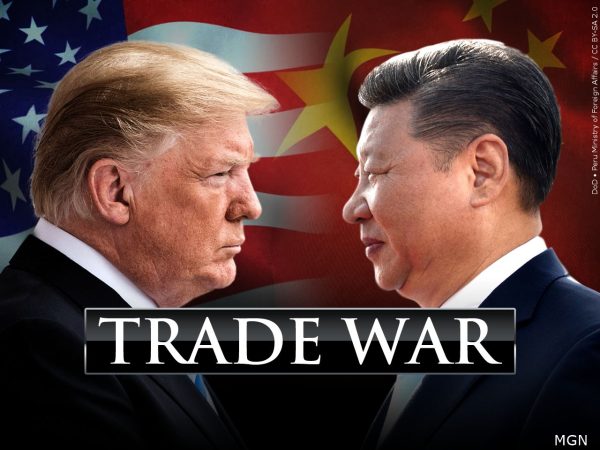
Chinese and American relations strain after 245% tariffs are declared, leaving many wondering how this will shape the American and global economy in the coming months or years.
125% of the tariff is reported to be reciprocal, 20% is to address the fentanyl crisis and 7% to 100% is a Section 301 tariff, according to the United States White House Fact Sheet. Section 301 tariffs refer to any additional tax applied to imports from nations that the U.S. feels violate fair trade practices.
This decision comes after a universal sweeping tariff initially announced to be 10% on all countries, but has steadily risen due to rising tensions.
“The tariffs are totally ridiculous,” said Roger Coate, a professor of political science and public administration. “I don’t know any economist who supports the idea of a uniform trade war. The way he has rolled it out has been a disaster.”
In American markets, the S&P 500 fell more than 20%, something called a bear market, and signifies an aggressive downward turn of a market – similar to a bear’s claw swipe. The S&P 500 had its worst week since COVID began in 2020 and crashed the global economy.
The sudden downturn in global and especially American markets has made many people scared of a recession or depression.
“Generally speaking, I think people are too pessimistic about recessions,” said J.J. Arias, a professor of economics and chair of the department of economics and finance. “In this case, there is a threat of a recession. I don’t think it’s inevitable by any means because the US economy is very resilient, but firms aren’t going to hire or expand in uncertainty. Even if the trade war ends, I worry that Canada and the EU have decided to just change their trading patterns.”
When the tariffs were incorrectly announced to be paused, the S&P 500 soared 9.5%, though the index is still below what it was before the tariff announcement.
While the White House has implied their tariff plan is well-liked and supported by economists, the actual matter seems to be more debated. With titles like “President Trump’s Bold Trade Action Draws Praise” and “Support Grows for President Trump’s America First Reciprocal Trade Plan,” the White House does not seem to plan to back down on tariffs anytime soon.
Blanket tariffs are mutually harmful to all countries involved.
Students and faculty showed wariness over the tariffs and their possible effects.
“He’s destroying the human rights promotion of democracy, everything that the past republican presidents have stood for,” Coate said.
Due to the high tariffs and tension between China and the U.S., many Chinese manufacturers flooded TikTok and Instagram to “expose” how American goods are being made.
The volume of TikTok videos urging users to source products directly from Chinese factories rose by almost 250% during the week of April 13, according to the New York Times.
Manufacturers who have been exposing the real cost of goods push for Americans to buy directly from the factory, but it’s unclear how truthful some of the accounts are.
“It depends on the quality of the products,” Coate said. “That’s what international trade is about. It’s being able to get a quality product at the best price you can get it. That’s what our laissez-faire free trade is all about.”
Students overall seemed disinterested in buying from manufacturers.
“I’m not sure I would buy from the manufacturers,” said Barbara Durr, a senior art major.
Many news outlets also suggested Americans buy major purchases, such as phones or cars, now. GCSU faculty and students recommended the same.

